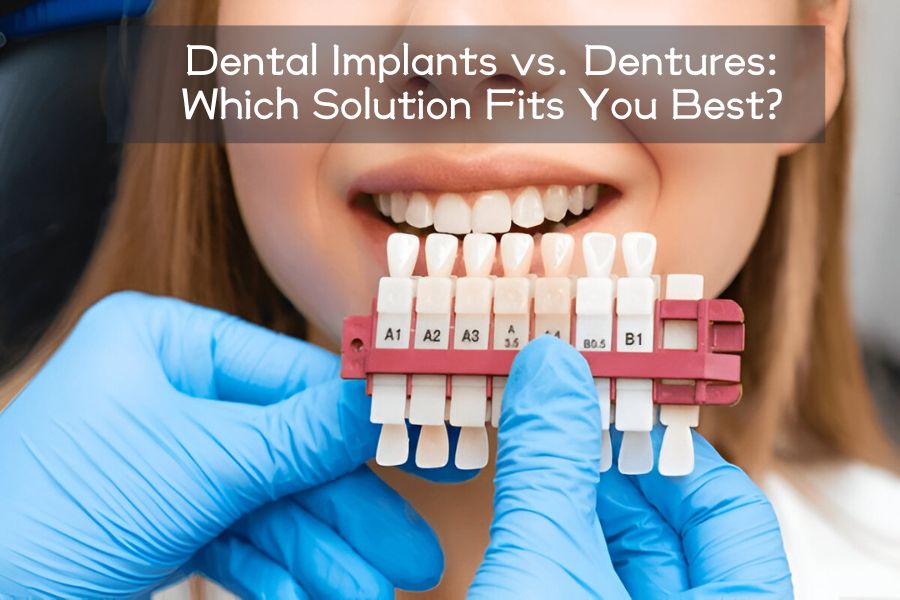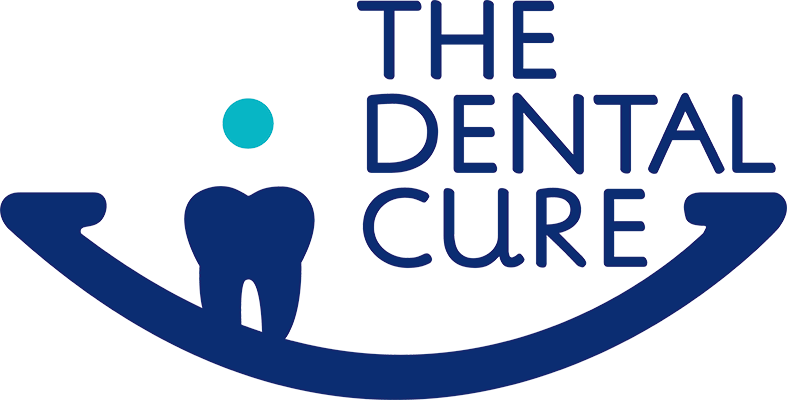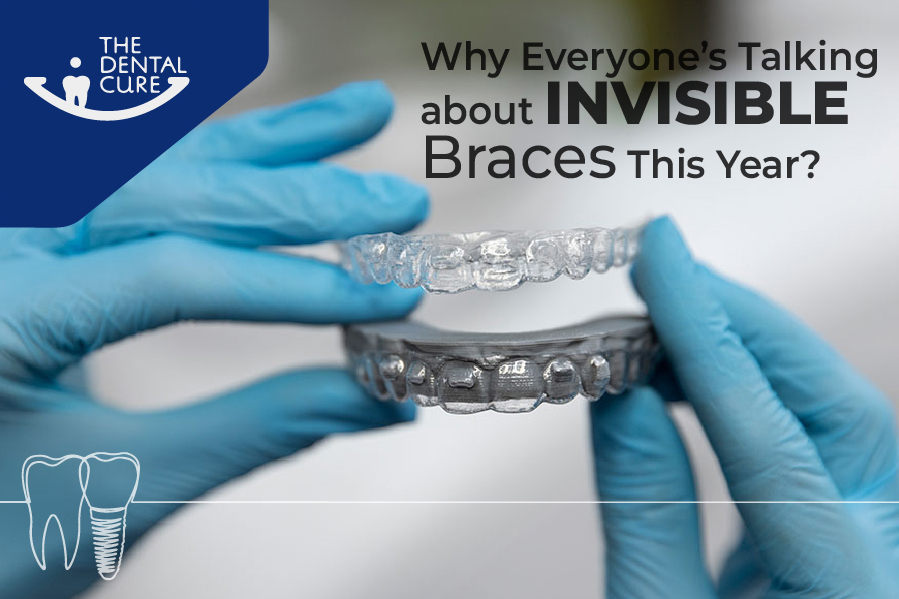
Confused about Implants and Dentures, Which one is right for you? Then this article is for you. I have tried to cover all the important points related to Dental Implants and Dentures.
Replacing missing teeth isn’t just about having a great smile. It’s about taking care of your oral health, preserving your jawbone, and improving your overall quality of life. If you’re trying to decide between dental implants and dentures, it’s important to understand what sets them apart, the benefits they offer, and how much they cost.
Dental Implants vs. Dentures
So, we’ll break down the key differences between these options, including exciting advancements like implant-supported overdentures and All-on-4 denture implants, so you can feel confident in choosing the solution that’s right for you.
What Are Dentures?

Dentures are removable devices used to replace missing teeth. They can be made from acrylic, resin or metal and come in different sizes. They can be customized to fit the patient’s needs, whether for replacing some teeth (partial dentures) or all teeth (full dentures).
Types of Dentures:
- Complete Dentures: Replace all teeth in the upper or lower jaw.
- Partial Dentures: Replace only a few missing teeth, secured by clasps around existing natural teeth.
- Overdentures: Rest on natural teeth or dental implants for added stability.
Benefits of Dentures:
- Affordability: Dentures are generally more cost-effective than implants, making them accessible for those on a budget.
- Non-Invasive: They do not require surgery, making them a suitable option for individuals with medical conditions or insufficient jawbone density.
- Quick Solution: Dentures can be fabricated and fitted relatively quickly.
Drawbacks of Dentures:
- Bone Loss: Dentures do not prevent jawbone resorption, which can lead to changes in facial structure over time.
- Maintenance: Require regular cleaning and adhesives to stay in place.
- Stability Issues: May shift while eating or speaking, especially if not well-fitted.
What Are Dental Implants?

Dental implants are permanent, surgically placed replacements for missing teeth. They consist of a titanium post inserted into the jawbone, topped with a crown, bridge, or even dentures for full-mouth restoration.
Innovative Implant Solutions:
- All-on-4 Implant Dentures: Supports a full arch of teeth using just four strategically placed implants. This method is faster and more cost-effective than traditional implants.
- Implant-Supported Overdenture: Combines the affordability of dentures with the stability of implants. These overdentures snap onto implants, offering a secure fit.
Benefits of Dental Implants:
- Durability: Dental implants are a long-term solution, often lasting 20+ years with proper care.
- Bone Health: Implants stimulate the jawbone, preventing bone loss and preserving facial structure.
- Natural Functionality: They feel and function like natural teeth, providing superior comfort and chewing ability.
- Aesthetic Appeal: Implants offer a realistic look, closely resembling natural teeth.
Drawbacks of Dental Implants:
- Higher Initial Cost: While the upfront cost of artificial teeth with implants is higher, they are a one-time investment.
- Surgical Procedure: Requires adequate healing time after placement.
- Bone Requirements: Sufficient jawbone density is essential, though bone grafting can address this issue.
Key Differences Between Dentures and Implants
| Feature | Dentures | Dental Implants |
|---|---|---|
| Comfort | Can cause discomfort or sore spots | Feels like natural teeth |
| Maintenance | Needs daily removal and cleaning | Regular brushing and flossing |
| Stability | May shift while eating or speaking | Fixed and secure |
| Bone Health | Does not prevent bone loss | Stimulates and preserves jawbone |
| Appearance | Can look natural but not as realistic as implants | Closely resembles natural teeth |
| Cost | Lower upfront cost | Higher initial cost, but fewer replacements |
Which Option Is Right for You?
Choose Dentures If:
- You are looking for an affordable, non-invasive solution.
- You need a temporary or immediate fix for missing teeth.
- Surgery is not an option due to medical conditions.
Choose Dental Implants If:
- You want a long-lasting, durable solution.
- You have adequate jawbone density or are willing to undergo bone grafting.
- You prioritize a natural appearance and functionality.
Conclusion: Bridging the Gap Between Comfort and Longevity
Both dentures and dental implants come with their own set of benefits and considerations. Dentures are a more affordable and accessible solution for replacing missing teeth, making them an excellent choice for those on a budget or seeking a non-invasive option. On the other hand, dental implants stand out for their superior stability, long-lasting durability, and ability to preserve jawbone health.
If you’re looking for a solution that balances cost and functionality, consider advanced options like implant-supported overdentures or All-on-4 denture implants. These treatments combine the affordability of dentures with the stability and comfort of implants, offering the best of both worlds.
Choosing the right option depends on your oral health, lifestyle, and personal preferences. Consulting a qualified dentist is the key to making an informed decision that meets your needs. Remember, investing in your smile is an investment in your confidence and overall well-being.
FAQs
1. What is the difference between dental implants and dentures?
- Answer: Dental implants are fixed structures which are surgically placed to replace a missing tooth; dentures are removable appliances that can replace all or some of the teeth. Dentures have a shorter lifespan and require frequent adjustments on the other hand implants are more permanent and little adjustments will be required.
2. What is the cost of artificial teeth for implants and dentures?
- Answer: The cost varies:
- Dentures: Starting from ₹15,900 (Complete Dentures), depending on the type.
- Implants: Starting from ₹19,990 per implant, depending on the type.
Implants have higher upfront costs but offer long-term value.
3. What are overdentures, and how are they different from regular dentures?
- Answer: Overdentures are dentures that are secured over natural teeth or dental implants for better stability and comfort. Unlike regular dentures, they are more secure and reduce the risk of slipping during eating or speaking.
4. What are All-on-4 denture implants, and who are they for?
- Answer: All-on-4 is a technique where a full arch of teeth is supported by just four implants. It’s ideal for individuals who have lost most or all of their teeth and want a fixed, cost-effective alternative to traditional implants.
5. Are dental implants better than dentures?
- Answer: Dental implants are often considered better due to their stability, durability, and ability to prevent bone loss. However, they require surgery and a higher initial investment. Dentures are better for those seeking a non-invasive and budget-friendly solution.
6. How long do dentures and implants last?
- Answer:
- Dentures: Typically last 5–10 years but may need adjustments.
- Dental Implants: Can last 20+ years with proper care, making them a more durable option.
7. Can I replace my dentures with dental implants?
- Answer: Yes, you can upgrade from dentures to implants or an implant-supported overdenture. This provides better stability, improved chewing ability, and a more natural feel.
8. Do dentures or implants prevent bone loss?
- Answer: Dental implants stimulate the jawbone and prevent bone resorption. Traditional dentures do not prevent bone loss and may even accelerate it due to the lack of stimulation to the jawbone.
9. What is an implant-supported overdenture, and why should I consider it?
- Answer: An implant-supported overdenture is a hybrid solution where dentures are secured by implants, offering the affordability of dentures with the stability of implants. It’s a great option for those who want a more secure fit without the cost of a full-mouth implant restoration.
10. What are the risks or downsides of dental implants and dentures?
- Answer:
- Dental Implants: Require surgery, take longer to heal, and have a higher upfront cost. Not suitable for everyone without sufficient bone density.
- Dentures: May cause discomfort, require regular adjustments, and don’t prevent bone loss.
If you are looking for Dentures or Dental Implants in Gurgaon then Visit Us.







